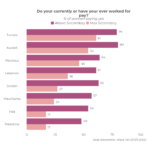“Over the course of just one week, the Tunisian government has made three concerning moves that, taken together, signal a major backsliding in its democratic development. The first occurred on September 11 when Tunisia’s Parliament approved a government reshuffle that enabled the replacement of 13 of 28 cabinet ministers. It was an alarming move, as some of the new ministers have ties to the former regime of dictator Zine el Abidene Ben Ali, who was ousted in 2011 during the Arab Spring. The second incident took place three days later. After a divisive, years-long debate over President Beji Caid Essebsi’s controversial economic reconciliation law (dubbed the “administrative reconciliation law”), Parliament passed it 119 to 98 with 90 members boycotting the vote…”
Visit External SiteTopics
- Charity2
- Corruption113
- COVID-1969
- Democracy35
- Discrimination13
- Economy225
- Education51
- Environment36
- Extremism19
- Freedoms50
- Gender Issues159
- Governance253
- Health44
- International Relations192
- Labor Market34
- Media31
- Migration63
- Political Institutions213
- Political Participation33
- Political Systems60
- Refugees6
- Religion118
- Security31
- Social Justice44
- Wellbeing2
- Youth75


